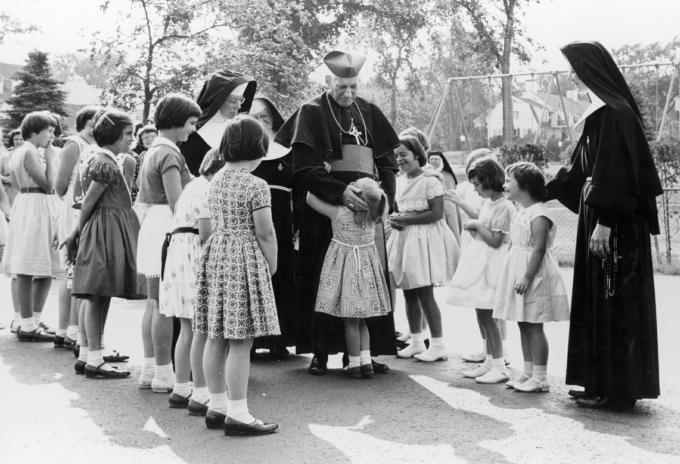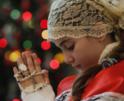
Culture
Today, Cardinal Cushing is remembered as a prolific builder and fundraiser for the archdiocese, but often overlooked are the ways his efforts were tailored to meet the specific needs of the poor, the sick, the elderly, and the disabled.
On the grounds of the Cardinal Cushing Centers in Hanover, the Portiuncula Chapel stands atop a forested hill. An exact replica of the chapel built by St. Francis more than 700 years ago, every piece of the building -- from its stones to its frescoes -- came directly from Assisi and the surrounding Umbria region of Italy. This is the final resting place of Cardinal Richard Cushing.
The chapel at Hanover was constructed in 1953 for the Sisters of St. Francis of Assisi and the children in their care. These were children with a range of intellectual and physical disabilities, all of whom Cardinal Cushing referred to as "exceptional children." Over the course of his episcopal career, the cardinal held a special place in his heart for these children and worked to ensure that they received the best medical care and education that the Church could provide.
Today, Cardinal Cushing is remembered as a prolific builder and fundraiser for the archdiocese, but often overlooked are the ways his efforts were tailored to meet the specific needs of the poor, the sick, the elderly, and the disabled. Most of all, he directed his efforts toward the "exceptional children," who, he wrote, have "exceptional claims on our love, our generosity, and service."
In 1947, Cardinal Cushing purchased 175 acres of land in Hanover to establish a school for children with disabilities. He hoped to model the school on St. Coletta School in Jefferson, Wisconsin, which was run by the Sisters of St. Francis. He invited the sisters to the archdiocese, and by the year's end, the first 35 students were welcomed into their new school -- St. Coletta by the Sea.
Most of the funds to build the school came from Joseph P. Kennedy, whose own daughter, Rosemary, had been sent to St. Coletta in Wisconsin in 1941. Generous as Kennedy was, his donations alone could not sustain a school. Cardinal Cushing put his fundraising talents at the service of the school for decades, presiding at countless charity operettas, festivals, and dinners, including an annual Christmas party for the school's benefit. His behind-the-scenes work for the school and its children is evident in his correspondence, where appeals to donors are constant.
Two years after St. Coletta's opened its doors, the cardinal opened another institution for his "exceptional children," this one closer to home. The Joseph P. Kennedy Jr. Memorial Hospital in Brighton opened on Sept. 8, 1949, to serve disabled children, regardless of race, religion, or economic status. The cardinal had again turned to the Kennedys for funding. The family's foundation contributed $600,000 for the hospital's construction. Upon completion, Kennedy Memorial was staffed by the Franciscan Missionaries of Mary, who became its dedicated nurses, physical therapists, pharmacists, administrators, and childcare specialists.
As was the case with St. Coletta's, the cardinal worked tirelessly to ensure that the needs of the children at Kennedy Memorial were met. Especially fruitful were his appeals to the generosity of Lou and Lutza Smith, who became the hospital's most enthusiastic patrons. In 1961, a new surgical suite opened and was named in their honor. "Children, can any of you count to a million?" the cardinal asked with a grin after its opening, acknowledging years of contributions from the Smiths.
Cardinal Cushing was not merely a financial benefactor of the "exceptional children" of St. Coletta's and Kennedy Memorial, he was also their most loyal friend. In time, he came to view these children as family. In one magazine article, he wrote to the parents of disabled children, "I know when you laugh and I know when you cry, because I have a whole family of exceptional children myself." On the silver jubilee of his episcopal consecration, Cardinal Cushing declined all public honors but one -- an operetta presented by the children at St. Coletta. "I could never refuse the heroic efforts of these children to pay a tribute of love to me," he wrote. "This is the greatest tribute I could receive." On his 73rd birthday, he was presented with an enormous four-tiered birthday cake. After blowing out the candles, the cardinal sent the cake over to the children at St. Coletta's.
In 1959, the cardinal appealed to the State Department to allow 63 disabled children to fly on his personal passport for a pilgrimage to the Shrine of Our Lady of Lourdes. The Department approved this unusual request, and Cardinal Cushing, with a small army of women religious, accompanied the children to France. One child on this pilgrimage, Peggy Sullivan, later recalled the trip as a time of "indefinable joy." Her experience was shared by the cardinal, who was never more joyful than he was when he was among his "exceptional children."
VIOLET HURST IS AN ARCHIVIST FOR THE ARCHDIOCESE OF BOSTON.
Recent articles in the Culture & Events section
-
Tolkien's world, still popular on the big screen, began with faith and wordsCecilia Hadley
-
Scripture Reflection for Dec. 22, 2024, Fourth Sunday of AdventDeacon Greg Kandra
-
Getting adult children to Christmas MassGreg Erlandson
-
The work of redemptionEileen McLaughlin
-
Intern reflectionsEmily Greco and James Kaeser


















